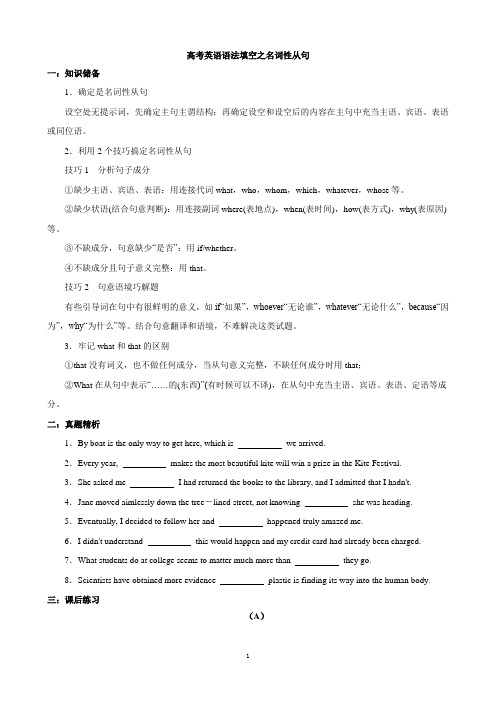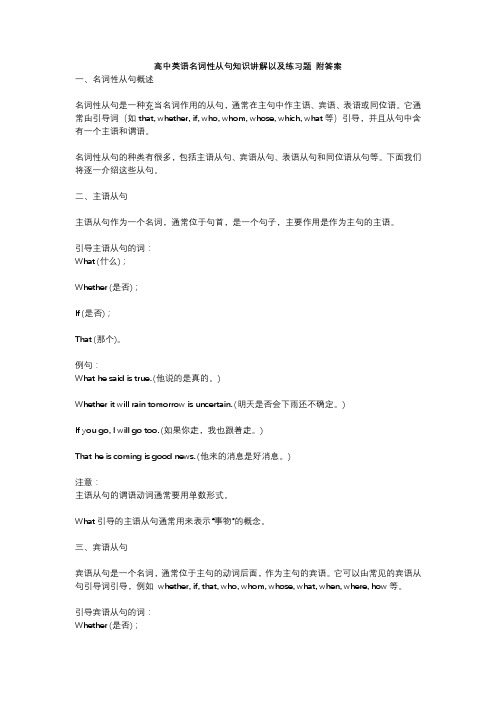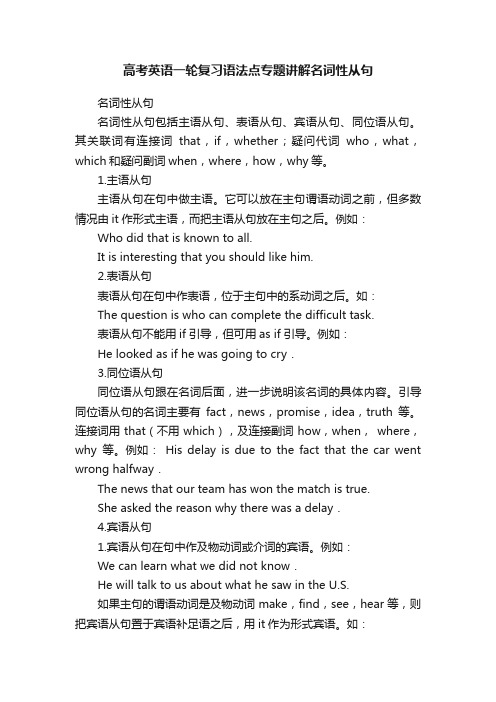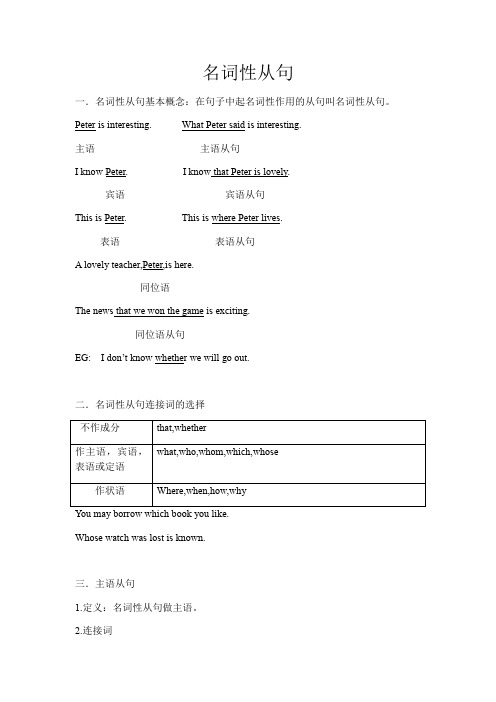2012高考英语 备考之名词性从句
高考英语语法必考知识点:名词性从句

高考英语语法必考知识点:名词性从句1什么叫名词性从句从命名法的角度,名词性从句拆开来就是名词性的一个从句。
从句,顾名思义它是从属的成分,它是从属于主句存在的,不能单独存在,就类似于一个家里面一个大人带着一个小孩才能去玩,不能这个小孩自己单独去玩。
名词性顾名思义这个从句它是一个名词性的,就相当于这个从句它就是个名词,那么它在主句中要充当名词能充当的成分。
主句中名词的成分可以是主语、宾语、表语、同位语,所以名词性从句就是用一个句子在主句中充当主语或者宾语或者同位语或者表语的这样的成分,可以简单地记成名词性从句,包括主宾表同四大从句,这个就是名词性从句的本质和功能。
2名词性从句的难点(1)对名词性从句本质的理解和句子结构的划分名词性从句是镶嵌在主句中的,它不像定语从句,定语从句是主句穿了一个马甲,比如主谓宾,然后在主语后面加一个定语从句来修饰这个主语,而名词性从句不一样,它是直接用这个从句去做主句的主语或者做主句的宾语,所以在理解的时候名词性从句是没有办法拿掉的,一定要和主句一起来理解,那么这就是在划分名词性从句结构,分析句子结构的时候的一个难点。
(2)具体的引导词的用法没有办法直接把两个句子合在一起,就不得不说一个句子是从句,这样就一定要有标记词来告诉我们,这个句子是一个从句。
举个例子:我知道他迟到了。
在这句话中,我是主语,知道是谓语。
他迟到了这件事作为宾语。
所以他迟到了就是作为宾语从句。
在英语中不能直接说我知道他迟到了。
而是说我知道that他迟到了。
因为这个that的存在就把他迟到了这件事变成了一个名词性从句的成分,整个句子就相当于是一个名词作主句的宾语。
那么主语从句、表语从句和同位语从句也是一样的道理,需要在这个从句前面加一个引导词来表明这个从句的身份,给他戴个帽子。
所以在学习从句的时候的两个难点,一个是名词性从句,本质的理解,句子结构的划分,而另一个就是具体的引导词的用法,这一个是同学们在学习的时候一定要重点注意的。
高考英语语法填空之名词性从句

高考英语语法填空之名词性从句一:知识储备1.确定是名词性从句设空处无提示词,先确定主句主谓结构;再确定设空和设空后的内容在主句中充当主语、宾语、表语或同位语。
2.利用2个技巧搞定名词性从句技巧1分析句子成分①缺少主语、宾语、表语:用连接代词what,who,whom,which,whatever,whose等。
②缺少状语(结合句意判断):用连接副词where(表地点),when(表时间),how(表方式),why(表原因)等。
③不缺成分,句意缺少“是否”:用if/whether。
④不缺成分且句子意义完整:用that。
技巧2句意语境巧解题有些引导词在句中有很鲜明的意义,如if“如果”,whoever“无论谁”,whatever“无论什么”,because“因为”,why“为什么”等。
结合句意翻译和语境,不难解决这类试题。
3.牢记what和that的区别①that没有词义,也不做任何成分,当从句意义完整,不缺任何成分时用that;②What在从句中表示“……的(东西)”(有时候可以不译),在从句中充当主语、宾语、表语、定语等成分。
二:真题精析1.By boat is the only way to get here, which is we arrived.2.Every year, makes the most beautiful kite will win a prize in the Kite Festival.3.She asked me I had returned the books to the library, and I admitted that I hadn't.4.Jane moved aimlessly down the tree-lined street, not knowing she was heading.5.Eventually, I decided to follow her and happened truly amazed me.6.I didn't understand this would happen and my credit card had already been charged.7.What students do at college seems to matter much more than they go.8.Scientists have obtained more evidence plastic is finding its way into the human body. 三:课后练习(A)In 1863 the first underground passenger railway in the world opened in London.It ran for just under seven kilometers and allowed people to avoid terrible 1(crowd) on the roads above as they travelled to and 2 work.It took three years to complete and was built using an interesting method.This included digging up the road, 3(lay) the track and then building a strong roof over 4top.When all those had been done,the road surface was replaced.Steam engines 5(use) to pull the carriages and it must have been 6(fair)unpleasant for the passengers,with all the smoke and noise.However,the railway quickly proved to be a great success and within six months,more than 25,000 people were using 7every day.Later,engineers 8(manage) to construct railways in a system of deep tunnels (隧道),which became known as the Tube.This development was only possible with the 9(introduce) of electric-powered engines and lifts.The Central London Railway was one of the most 10(success) of these new lines,and was opened in 1900.It had white-painted tunnels and bright red carriages,and proved extremely popular with the public.(B)My mom was a nurse and often took me along to visit the 1(family) she was caring for,including one who had a series of strokes(中风) and was bedridden.One afternoon Mom told me that we needed to visit the woman 2(give) her medications,and that we would stop at a store 3the way.I thought we would stop at a drugstore,but we pulled up to a shopping mall.My mom 4(head) to the perfume counter and bought the most expensive bottle they offered.She also bought a beautiful nightdress.When I asked her who they were for,she said they were for her patient.She 5 (far) explained although this woman was quite old and bedridden,she was still a lady,and 6old deserved to be treated with respect and grace.When 7(care) for someone,we should look past the disability or the illness and look into the soul of the human,so we can connect them with sympathy.I soon realized that my mom’s greatest 8(strong) was taking care of those who cannot advocate for 9(they) and need trustworthy care providers.Actually,that’s the very reason 10I wanted to become a doctor myself.(C)China is the birthplace of kites.Most people believe they 1(invent) during the Spring and Autumn Period by the famous philosopher Mozi.It is said that he used wood to create a “ 2(fly) bird” that flew in the sky for a whole day.Kites were 3(late) used as military instruments to measure distance,test the wind, aid communication, and rescue people. During the Tang Dynasty, they were used more as a tool for 4(entertain) than a military instrument.At first,only royal family members could play with kites. Later it became popular among commoners who flew them on 5(importance) events and festivals.In the Ming Dynasty, kites were once again used 6military purposes. Many emperors ordered their soldiers to fly kites 7carried explosives.The explosives would fall on the enemy and gave the Chinese a great edge on the battlefield.Nowadays,flying kites has become 8popular form of entertainment and competition.More and more people at home and abroad are fond of flying kites in local or international events 9(show) their kite-making and kite-flying skills.The largest kite museum of the world is in the city of Weifang,10(know) as “Kite Capital of the World”,and every year,kite fans all over the world come to watch and take part in the annual International Kite Festival.。
高中英语名词性从句知识讲解以及练习题 附答案

高中英语名词性从句知识讲解以及练习题附答案一、名词性从句概述名词性从句是一种充当名词作用的从句,通常在主句中作主语、宾语、表语或同位语。
它通常由引导词(如that, whether, if, who, whom, whose, which, what等)引导,并且从句中含有一个主语和谓语。
名词性从句的种类有很多,包括主语从句、宾语从句、表语从句和同位语从句等。
下面我们将逐一介绍这些从句。
二、主语从句主语从句作为一个名词,通常位于句首,是一个句子,主要作用是作为主句的主语。
引导主语从句的词:What (什么);Whether (是否);If (是否);That (那个)。
例句:What he said is true. (他说的是真的。
)Whether it will rain tomorrow is uncertain. (明天是否会下雨还不确定。
)If you go, I will go too. (如果你走,我也跟着走。
)That he is coming is good news. (他来的消息是好消息。
)注意:主语从句的谓语动词通常要用单数形式。
What引导的主语从句通常用来表示“事物”的概念。
三、宾语从句宾语从句是一个名词,通常位于主句的动词后面,作为主句的宾语。
它可以由常见的宾语从句引导词引导,例如whether, if, that, who, whom, whose, what, when, where, how等。
引导宾语从句的词:Whether (是否);If (是否);That (那个);Who (谁);Whom (谁);Whose (谁的);What (什么);When (何时);Where (何处);How (如何)。
例句:I know that he is coming. (我知道他要来。
)I wonder if he is telling the truth. (我想知道他是否说了真话。
高考英语一轮复习语法点专题讲解名词性从句

高考英语一轮复习语法点专题讲解名词性从句名词性从句名词性从句包括主语从句、表语从句、宾语从句、同位语从句。
其关联词有连接词that,if,whether;疑问代词who,what,which和疑问副词when,where,how,why等。
1.主语从句主语从句在句中做主语。
它可以放在主句谓语动词之前,但多数情况由it作形式主语,而把主语从句放在主句之后。
例如:Who did that is known to all.It is interesting that you should like him.2.表语从句表语从句在句中作表语,位于主句中的系动词之后。
如:The question is who can complete the difficult task.表语从句不能用if引导,但可用as if引导。
例如:He looked as if he was going to cry.3.同位语从句同位语从句跟在名词后面,进一步说明该名词的具体内容。
引导同位语从句的名词主要有fact,news,promise,idea,truth等。
连接词用that(不用which),及连接副词how,when,where,why等。
例如:His delay is due to the fact that the car went wrong halfway.The news that our team has won the match is true.She asked the reason why there was a delay.4.宾语从句1.宾语从句在句中作及物动词或介词的宾语。
例如:We can learn what we did not know.He will talk to us about what he saw in the U.S.如果主句的谓语动词是及物动词make,find,see,hear等,则把宾语从句置于宾语补足语之后,用it作为形式宾语。
高考英语语法之名词性从句

1.名词:表示人或事物的名称的词叫名词。 2.名词的句法作用:名词在句中主要作主语、宾 语、表语和同位语。另外还可以作定语、状语。 3.名词性从句: 在英语的句子结构中,本来该由名词充当的主 语、宾语、表语和同位语,由一个句子来充当, 这个句子就叫名词性从句。 4.名词性从句的种类: 根据名词性从句在句子中所充当的不同成分, 名词性从句可以分为主语从句、宾语从句、表 语从句和同位语从句。
2.When he will go to America is not yet fixed.
(It is not yet fixed when he will go to America.)
宾语从句
在复合句中作主句的宾语.引导 词有连词that (that 常可省 略),whether,if; 代词有who, whose,what ,which
表语从句
在复合句中作主句的表语. 引导词有连词that (that 不可 省),whether; 代词有who, what ,which;
副词 when ,where, how, why
等.
The problem is that we didn’t get in touch with him.
This is how Henry solved the problem. His suggestion is that we (should) finish the work at once.
(4).It is not yet decided which cash crop will be produced next year. (5).Whatever he said was right.
(6).Whoever goes there must get ready by 6 o’clock.
高考英语复习 名词性从句讲解

名词性从句一、名词性从句与简单句的区别在英文中,名词或名词短语主要充当四种句子成分:主语、宾语、表语和同位语。
如果把句子当作名词来用,分别充当另一句话的主语、宾语、表语或同位语,于是便构成了四种从句:主语从句、宾语从句、表语从句和同位语从句。
因为这四种从句在本质上相当于名词的作用,所以将其统称为名词性从句。
请看下表:在英语中,相当于名词作用的句子有三类,陈述句、一般疑问句以及特殊疑问句。
因此,名词从句就是用三种句子来分别充当另外一个句子的四种句子成分,者就构成了名词从句的本质特征。
但是,这三种句子不是直接放在另一个句子中作成分,而是要作各种变化调整。
接下来将具体讨论。
二、陈述句作句子成分1. 要在陈述句句首加上t hat用”that+陈述句”这一结构分别充当另一个句子的四种成分。
2.为什么要加that?对于陈述句,为什么要在其句首加that 后才能用它作成分呢?而为什么在宾语从句中that 又可以省去呢?因为在英文中,句子的核心意思主要是靠谓语部分来表达,一个句子只表达一个核心意思,也就是只能有一个谓语部分。
而添加that,相当于一个“指路牌”,能够帮助我们指明段句的方向,而不至于造成歧义。
而对于宾语从句,主句的谓语已经出现,后面所接的成分自然是谓语,所以在不会影响句子的意思下,是可以把that 省去的。
三、一般疑问句作句子成分1.用w hether 或if 引导先将疑问句的倒装语序变成陈述句语序(即主语放在谓语的前面),并在句首加上whether 或if(if 只用在宾语从句中)来引导,以保留原句的疑问意义。
即“whether+陈述句”2. if 还是 whether?1)if 一般只用于引导宾语从句,而 whether 可引导宾语从句在 内的其他名词从句。
IF he comes or not makes no difference. 成 Whether he comes or not makes no difference.2)if 不和 or not 直接连用,即一般不说 if or not, 但可以说 if...or not 。
英语名词性从句讲解【完整版】

2、I asked him if he could do me a favor .
If与whether的区别:
1、If不能引导放于句首的主语从句,而whether可以。 2、引导表语从句用whether,不用if。 3、引导同位语从句用whether,不用if。 4、whether可以引导从句作介词的宾语,不用if 。 5、whether or not 连在一起可以,但if不可以。而 “whether-----or not = if -----or not”
同位语从句:
定义:在复合句中充当同位语的句子。 同位语从句用来对其前面的抽象名词进行解释说明,被解释说明的词和 同位语在逻辑上是主表关系。 同位语常见名词:fact, suggestion, advice, idea, decision, news, thought, hope, belief, truth, doubt, promise, possibility, truth, warning, message, reason, report, question,explanation, wish, problem等。 常见的连接词:that, whether, what, who, how, when, where等。 用法: The thought that I want to buy my mother a birthday gift makes me excited.that 引导的同位语从句,解释说明 thought,从句不缺成 分 There is some doubt whether he will come. whether 引导同位语从句,if 不能引导同位语从句 we haven’t made the decision where we are going to spend our vacation. 有时同位语从句可以不紧跟解释说明的名词后面。 The news is surprising that he won the match.
高考英语复习-名词性从句

名词性从句一.名词性从句基本概念:在句子中起名词性作用的从句叫名词性从句。
Peter is interesting. What Peter said is interesting.主语主语从句I know Peter. I know that Peter is lovely.宾语宾语从句This is Peter. This is where Peter lives.表语表语从句A lovely teacher,Peter,is here.同位语The news that we won the game is exciting.同位语从句EG: I don’t know whether we will go out.二.名词性从句连接词的选择You may borrow which book you like.Whose watch was lost is known.三.主语从句1.定义:名词性从句做主语。
2.连接词That the earth moves around the sun is known to all.Whether we will go picnicing tomorrow depends on the weather.Who stands there is my father.2.用it作形式主语。
It be + 形容词/名词/过去分词+that从句It is a pity that he didn’t win the game.It is well known that the earth runs around the sun.EX:1.____we are invited to the concert this evening is good news to us.2.____we need is more time.3.__will come to have dinner is not known.4.It is common knowledge ____the whale is not a fish.5.It is known ____ he has agreed to my plan.四.宾语从句1.定义:名词性从句作宾语。
- 1、下载文档前请自行甄别文档内容的完整性,平台不提供额外的编辑、内容补充、找答案等附加服务。
- 2、"仅部分预览"的文档,不可在线预览部分如存在完整性等问题,可反馈申请退款(可完整预览的文档不适用该条件!)。
- 3、如文档侵犯您的权益,请联系客服反馈,我们会尽快为您处理(人工客服工作时间:9:00-18:30)。
2012高考备考英语之名词性从句名词在句中一般作主语、宾语、表语和同位语。
能象一个名词一样在句中充当这些成分的从句就叫名词性从句。
名词性从句包括主语从句、宾语从句、表语从句、同位语从句。
①What surprised me most was to see some of the village people seated on the benches at the end of the room.使我最为吃惊的是看到有些村民坐在教室后面的板凳上。
(主语从句)②This was what the blacksmith was reading.这就是铁匠在读的东西。
(表语从句)③Do you know why winter is colder than summer?你知道冬天为什么比夏天冷吗?(宾语从句)④They expressed the hope that they would come over to visit China again.他们表达了想再来中国的愿望。
(同位语从句,作hope的同位语)引导名词性从句的关联词有以下三类:从属连词:that, whether, if, as if (用于表语从句)连接代词:who, what, which, whom, whose等连接副词:when, where, why, how以及由how组成的词组how many, how long, how far 等㈠名词性从句的语序名词性从句的语序要用陈述句语序,而不要使用一般疑问句的语序如:Whether he will be able to come remains a question.他是否能来还是个问题。
The question is who will be the next speaker.问题是谁接着发言。
He admitted that he was wrong.他承认错了。
Can you tell me why a rocket can fly in outer space?你能告诉我为什么火箭能够飞入外层空间吗?I have no idea when he will be back.我不知道他什么时候回来。
㈡主语从句主语从句的三种类型:⒈由连词that引导:如:That China is a great socialist country is well known.中国是一个伟大的社会主义国家,这是众所周知的。
That he will come back soon is certain.他很快会回来是肯定的。
◆由连词that引导的主语从句,在大多数情况下会放到句子的后面,而用代词it作形式主语。
常见的以it作形式主语的主语从句句型有四种:It + be + 形容词+ that …It + be + 名词词组+ that…It + be + 过去分词+ that…It + seems/happens/appears/doesn’t matter/makes no difference + that…如:①It is clear (形容词)that we badly need help.很明显,我们急需帮助。
②It is necessary(形容词) that you (should ) master the computer.你很有必要掌握电脑。
(当形容词是necessary, important, strange等时,主语从句常用虚拟语气:(should) + 动词原形)③It is no wonder (名词词组) that he looks pale.难怪他看起来脸色苍白。
④It is a pity (名词词组)that we can’t go.我们不能去真是遗憾。
⑤It is still unknown (过去分词)that who will win the match.还不知道谁会赢得这场比赛。
⑥It is said(过去分词) that Mr. Green has arrived in Beijing.据说格林先生已到了北京。
⑦It happened that I had seen the film.碰巧我看过了那部电影。
⑧It seems that he is playing football.他似乎正在踢足球。
it 作形式主语代替主语从句时,要注意和as引导的定语从句的区别。
如:①It was reported that the US was under the terrorist attack.据报道,美国遭到恐怖分子的袭击。
(主语从句,有that, 无逗号)②As was reported, the US was under the terrorist attack.据报道,美国遭到恐怖分子的袭击。
(定语从句,无that, 有逗号)⒉由what(…所…的东西)、whatever(所…的一切)、whoever(一切…的人)等代词引导:如:What he wants to tell us is not clear.他要跟我们说什么,还不清楚。
Whoever is tired may rest.谁要是累了就可以休息。
Whatever was said here must be kept secret.这里所说的话都应保密。
⒊由连接代词或连接副词(或whether)引导:这类主语从句可以直接用在句首作主语,也可以放在句子后部去,前面用it作形式上的主语,这两种结构基本上可以换用,意思上没什么差别。
如:①When we shall have our sports meet is still a question.= It is a question when we shall have our sports meet.我们什么时间举行运动会还是个问题。
②Whether he will join us won’t make too much difference.= It won’t make too much difference whethe r he will join us.他是否加入到我们当中来没多大关系。
㈢表语从句表语从句放在主句中的连系动词后面,引导表语从句所用的的关联词和引导主语从句所用的关联词相同。
此外,连词as if也可以引导表语从句。
如:①That is where the red Army crossed the Yangtze River.这就是红军横渡长江的地方。
②This is exactly what I expected.这正是我希望的。
③It seems as if he would soon recover.他似乎快要恢复健康了。
㈣宾语从句引导宾语从句的关联词和引导主语从句的关联词相同。
在使用宾语从句时应注意时态的呼应:⒈如果主句是祈使句或主句的谓语动词是现在时或将来时,宾语从句的谓语可根据句意的需要而用任何一种时态。
如:①Peter believes that his dream will come true some day.彼得相信有一天他的梦想会实现。
(一般将来时)②Please tell me what you think of the project.请你谈谈你对这个工程的看法。
(一般现在时)③I will tell him that you have come .我要告诉他你来了。
(现在完成时)④I will tell him that you came this morning.我要告诉他你是今天上午来的。
(一般过去时)⒉如果主句中的谓语动词是过去时态,宾语从句中的谓语动词一般情况下要用过去时态的某种形式。
⑴在叙述过去的事情时,如果从句中的谓语动词所表示的动作与主句的谓语动词所表示的动作同时发生,从句要用一般过去时或过去进行时。
如:①He said that he was looking for Bill.他说正在找比尔。
②I asked whether he knew Japanese.我问他是否懂日语。
⑵如果从句的谓语动词所表示的动作发生在主句的谓语动词所表示的动作之前,从句要用过去完成时。
如:He told me that he had watched the football match.他告诉我已看过了这场足球赛。
⑶如果从句的谓语动词所表示的动作发生在主句的谓语动词所表示的动作之后,从句的谓语动词要用过去将来时。
如:I knew that he would come a few days later.我知道过几天他要来。
⒊如果宾语从句中说的是客观真理,谓语动词总是用一般现在时,而不受主句中谓语动词时态的影响。
如:①I realized that practice makes perfect.我懂得了熟能生巧的道理。
②He said that the sun rises in the east.他说太阳从东方升起。
◆连接代词/副词 + 不定式,常用在某些动词后面(decide, know, wonder, ask, tell, show, find out, consider, teach, promise等)来代替宾语从句。
如:①The book explains how to solve the problem.=…how we shall solve the p roblem.这本书解释如何解决这个问题。
②We’ll go to the zoo tomorrow. But I don’t know when to start.=…when we shall start.我们明天要去动物园,但是我不知道何时动身。
㈤同位语从句能接同位语从句的名词有:fact, idea, news, information, order, belief, suggestion, advice, hope, doubt, reply, answer, saying等,用来引导同位语从句的词有that, whether, when, where等。
如:①The fact that water is composed of hydrogen and oxygen is undeniable.水是由氢和氧化合而成这一事实是无可否认的。
②He must answer the question whether he agrees to it or not.他必须回答他是否同意此事这样一个问题。
③I have no idea when he will be back.我不知道他什么时候回来。
